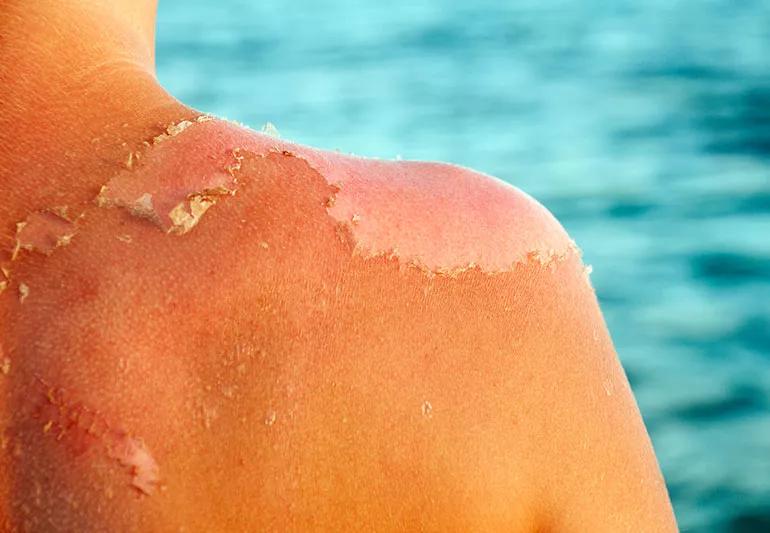A dermatologist explains this agonizing type of sunburn

Image content: This image is available to view online.
View image online (https://assets.clevelandclinic.org/transform/c21603a6-5431-48ff-80be-efe63ab4c2d6/HellsItch-175383361-770x533-1_jpg)
Close-up shot of sunburnt skin, peeling on the shoulder to expose raw skin.
Sunburns are common and so is the mild itching and pain that can accompany them. But for certain people, a healing sunburn can turn into a temporarily unrelenting nightmare that’s appropriately nicknamed “hell’s itch.” Though it may seem like a comical name, the symptoms it causes are anything but funny.
Advertisement
Cleveland Clinic is a non-profit academic medical center. Advertising on our site helps support our mission. We do not endorse non-Cleveland Clinic products or services. Policy
So, what the heck is it? “Hell’s itch is this deep, painful, almost throbbing, itch that happens one to three days after a sunburn, often on the upper back and shoulders,” says dermatologist Melissa Piliang, MD.
People have described their experiences as feeling “like fire ants are biting you under your skin,” “wanting to rip your skin off” or “an uncontrollable itch that, when scratched, causes stabbing pain.” The symptoms seem to come in waves and typically relent within 48 hours.
Hell’s itch appears to only affect a small percentage of people. “Anyone who has a sunburn could get it, but it seems to be more common in fair-skinned people and people who have been at higher altitudes where the sun is more intense, like in the mountains,” Dr. Piliang says.
It’s unclear exactly why hell’s itch happens, but it may be due to damage in the nerve endings at the site of your burn, triggering an overreaction. It seems to happen more often with severe sunburns.
Most cases of hell’s itch can be treated at home, but “if you have blisters over a large area of your body, fever, chills, dizziness or confusion, you should see a doctor,” Dr. Piliang advises.
She suggests these at-home remedies to relieve your symptoms:
Advertisement
If you develop hell’s itch once, you can get it again simply because it’s a risk for anyone with a sunburn. The only way to prevent it is to avoid getting a sunburn. Here are Dr. Piliang’s sunscreen tips:
Advertisement

Sign up for our Health Essentials emails for expert guidance on nutrition, fitness, sleep, skin care and more.
Learn more about our editorial process.
Advertisement
Leaving a severe sunburn untreated can lead to dehydration and heat-related illness
Resist the urge to peel, and treat your healing skin to some much-needed hydration
Soothe your red, burning skin by applying aloe vera, moisturizing and using a cold compress
A sunburn will leave you itchy and red, while sun poisoning can feel like an allergic reaction
The safest route for now is to avoid spray-style sunscreen, and opt for lotion-based ones instead
This cooling gel can help soothe sunburned skin, but it can’t cure the burn
Anything from minor irritations and chronic diseases to, yes, cancer can cause persistent itching
From hyperactive immune response to disordered nerve connections, the itch is real
Type 2 diabetes isn’t inevitable with these dietary changes
Applying a hot or cold compress can help with pain
Pump up your iron intake with foods like tuna, tofu and turkey